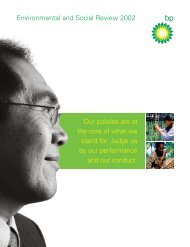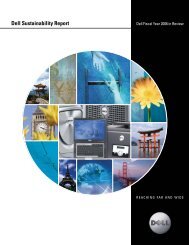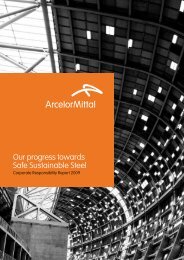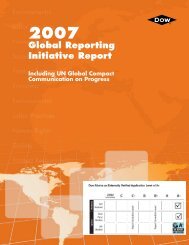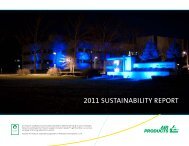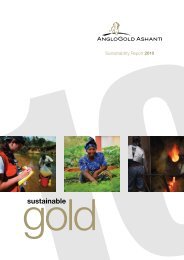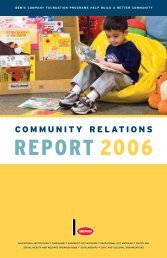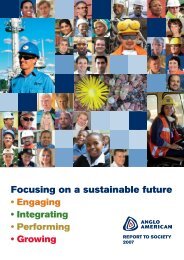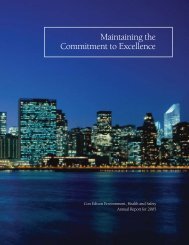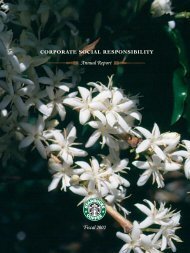Beyond the cup. - Starbucks
Beyond the cup. - Starbucks
Beyond the cup. - Starbucks
You also want an ePaper? Increase the reach of your titles
YUMPU automatically turns print PDFs into web optimized ePapers that Google loves.
Developing Innovative andFlexible Solutions to BringAbout ChangeThe same innovative spirit that has been a driving force forour business success is also applied to our environmentalpractices. Described below are some of <strong>the</strong> creative solutionswe’ve adopted to address one of our perennial challenges,waste reduction. We also report on our efforts to design andbuild a prototype of <strong>Starbucks</strong> sustainable store of <strong>the</strong> future.RECYCLING AND WASTE REDUCTIONWhe<strong>the</strong>r it’s our efforts to recycle materials, compostbiodegradable matter, or reuse products, it all helps to reduce<strong>the</strong> volume of solid waste that we generate.To better understand <strong>the</strong> composition and scale of <strong>the</strong> wastegenerated from our retail stores, we conducted ano<strong>the</strong>r wasteaudit in 2005, three years after <strong>the</strong> first audit. In <strong>the</strong> latestaudit we found that cardboard, plastic and soiled compostablepaper make up <strong>the</strong> greatest volume of store waste. Here aresome ways we are reducing waste in our stores.RecyclingThroughout our North American operations, store managersare expected to participate in local recycling programs. Wetrack <strong>the</strong> number of our U.S. and Canada company-operatedstores that have recycling programs. While recycling is notfeasible at every location, we have recently overcome somebarriers to make it easier for more of our stores to participate.At <strong>the</strong> end of fiscal 2005, 77 percent of our U.S. and Canadacompany-operated stores where <strong>Starbucks</strong> controls waste andrecycling had recycling programs, compared to 70 percent <strong>the</strong>previous year. (See page 61.)In many of our international markets <strong>the</strong>re is also stronginterest in recycling. For instance, <strong>Starbucks</strong> partners inGermany separate plastic, paper, glass and biodegradablewaste for recycling purposes. In France, our new store designsare incorporating space for recycling bins. <strong>Starbucks</strong> UKpiloted recycling programs in 90 local stores last summer andplans to include more locations in 2006. In Greece, <strong>Starbucks</strong>and <strong>the</strong> Hellenic Children’s Museum hosted seminars thatintroduced children to recycling and reusing.Reusable MugsTwo ways our customers can help cut down on waste are bybringing in <strong>the</strong>ir own commuter mugs, which earns <strong>the</strong>ma 10-cent discount, and by requesting that <strong>the</strong>ir beveragesbe served in ceramic mugs when it’s a “for-here” order.<strong>Starbucks</strong> U.S. customers used commuter mugs more than13 million times in fiscal 2005. (See page 61.) Although wedon’t currently track commuter mug usage outside <strong>the</strong> U.S.and Canada, this measure is gaining popularity among ourcustomers in places such as <strong>the</strong> UK, China and Australia.In Japan, a special task force has been initiated to introducereusable ceramic mugs to help reduce waste and comply withnew regulations.Reducing Coffee Grounds WasteWe continue to promote Grounds for Your Garden, a programthat offers complimentary five-pound (2.27-kilogram) bagsof used coffee grounds to customers and local parks to add to<strong>the</strong>ir soil. This program has been popular with our customersaround <strong>the</strong> world, including in France, Spain, <strong>the</strong> UK,<strong>the</strong> Philippines, Greece, Cyprus, China, New Zealand andHawaii. Because coffee grounds account for approximatelyone-third of <strong>Starbucks</strong> solid waste by weight, we plan to keepthis initiative.Reducing Food WasteIn Japan, <strong>the</strong> government is mandating a 20 percentreduction in food waste, which becomes effective in April2006. <strong>Starbucks</strong> Japan has created a special task force tostrategize ways to reduce food waste and comply with thisnew requirement. In doing so, we hope this will expose newmeasures we can adopt in our North American stores ando<strong>the</strong>r international locations.<strong>Starbucks</strong> partner Hilary Andersen gladly gives her customers a 10-cent discountwhenever <strong>the</strong>y use <strong>the</strong>ir own commuter mugs, a measure that helps to conserve <strong>the</strong>use of paper <strong>cup</strong>s.55ENVIRONMENT



